#jet wolf watches elisabeth
Explore tagged Tumblr posts
Text
Elisabeth: Like You (reprise)
Essen alternate title: “Poor Little Rich Girl (reprise)” Zuka alternate title: “Wait Is Elisabeth In This?”
“Like You (reprise)” is another song cut from the Takarazuka version, and as with many of its cuts, I feel it’s to the detriment of the character work. But that character work is with Elisabeth, and as we’ve seen several times throughout these posts, Takarazuka Elisabeth is unfortunately relegated to a side player in her own story, so I can understand why this was considered unimportant to the overall tale it was looking to tell. Additionally, as the “reprise” part suggests, it’s a revisit of Elisabeth’s first song, showing us who she was as a child with her life still ahead of her and her dreams alive and vibrant. Unfortunately, the Takarazuka version softballs that one as well, having Elisabeth’s father basically chastise her throughout (albeit affectionately) for not acting like a princess. It’s hard to use a past moment to illustrate the tragedy of the present when it’s basically going be her father saying “See? Told you so.”
Things are considerably different on that front with the Essen version, though, and so as we ride headlong toward Rudolf’s imminent demise, we take a moment to touch base with Elisabeth and see how she’s doing!
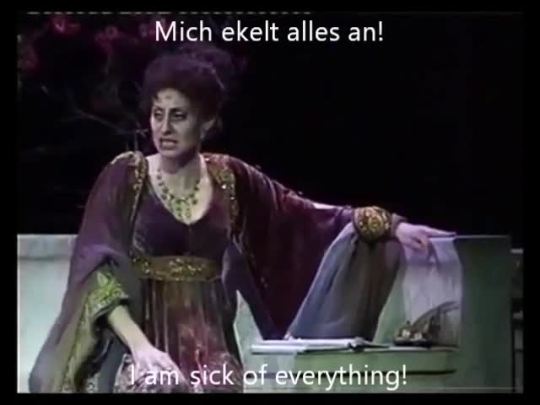
Awesome, glad to hear it!
We open the song with Elisabeth standing alone in her garden in god knows fucking where, but I’d guess somewhere relatively close to the main palace, unless Rudolf booked it across Europe. She communes first with a statue, seeming lost in the silent marble beauty of it, then begins to speak with warmth and affection to no one.
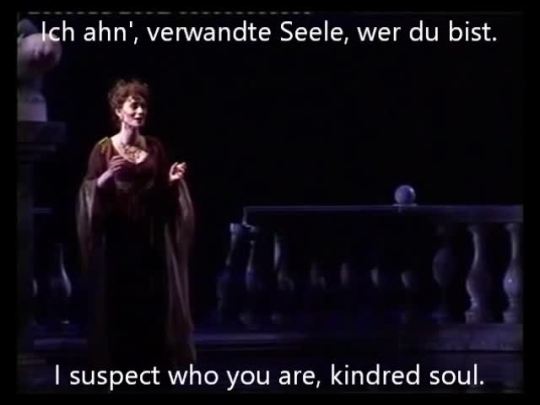
Let’s start digging in right now, because once you get the sense of the whole thing, THIS IS FUCKING BRILLIANT. Particularly linked from the previous scene, our natural assumption is that this is Rudolf, running to his mother for help and comfort. And it will be, we’re not wrong to go there. But this ISN’T to Rudolf, it’s to Heinrich Heine (the German Jewish writer who you may recall being mentioned as revered by Elisabeth back in “Hate”). However much Rudolf’s convinced himself that he and Elisabeth are those kindred souls, she identifies more with a dead writer she never met than her own son, and is kinder to a ghost than the living (keep note, this’ll be particularly relevant in a few songs).
(As a side note, as I typed this, I realized it’s another way the Takarazuka cutting this song makes sense; it shows Elisabeth’s affinity for death as a concept, rather than Death as a singular embodiment, which is only the exact opposite of the Takarazuka’s entire mission statement.)
Excited, showing genuine emotion that isn’t anger, apathy, or defiance, Elisabeth asks Heinrich Heine to stay a while.
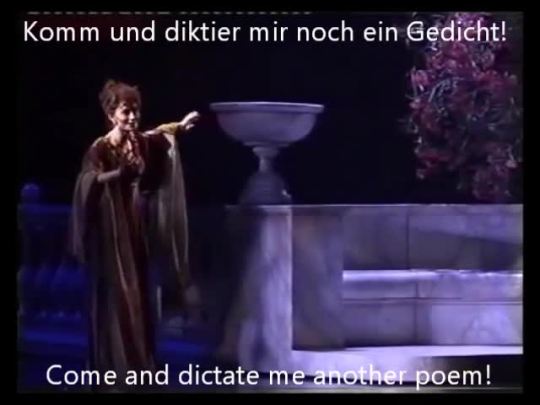
Which, among an assortment of things, strongly suggests that this isn’t the first time Elisabeth and Heinrich have had a chat. So is she crazy, then? Well if we take all this literally, she’s been singing and dancing with the embodiment of Death since she was like fourteen, SO MAYBE. But I think more, it’s just a part of herself she indulges like a fantasy. In these moments, she’s once again that child who wanted nothing more than the freedom to write poems and ride with the wind. Which brings us back around to the greatest tragedy for Elisabeth: she CAN do that shit. Fuck, she IS. She wandered Europe for over a goddamn decade, going wherever she wanted, seeing whoever she wanted, doing whatever she wanted. Here she is in her personal private house/mansion/palace, and she’s LITERALLY WRITING POETRY. She’s doing exactly what she said she always wanted to do, yet she can’t own it. She isn’t writing poetry, she’s simply taking dictation. But realizing this would mean giving in, it would be accepting that maybe her life isn’t actually all that bad, it would mean she’d have to yield just a touch. And that, as we’ll have reinforced in just a moment, is something Elisabeth can never and WILL never do.
This isn’t Heinrich Heine, though, and for a moment, Elisabeth looks afraid.
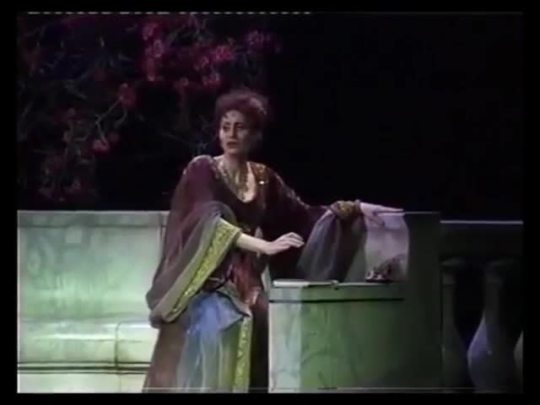
A second to say that PIa Douwes absolutely fucking KILLS in this scene. She pretty much does in all scenes, true, but this one is so dependent on sheer acting, and acting to someone who isn’t even there to boot, and she conveys so many emotions so well, it’s incredible.
So yeah, Elisabeth looks afraid for a second when she realizes she’s opened up, even just a tiny crack, to someone else. And it’s important to remember, the primary point of this scene is to prepare us for the next, to help us understand Elisabeth’s feelings before she’ll bring it all to bear on poor doomed Rudolf. She’s SO in control of herself, so bound and determined to never bend, that even the idea of expressing a genuine-even-if-twisted emotion TO THE WRONG GHOST causes to her to freeze in terror for a second.
It fades quickly enough when she recognizes the spirit is her father instead, and then we finally get what’s probably the truest Elisabeth we’ve seen since her wedding night. They begin to sing together, reprising their song from the beginning of the musical, and Elisabeth allows herself to be lost in it for a moment. But just a moment.
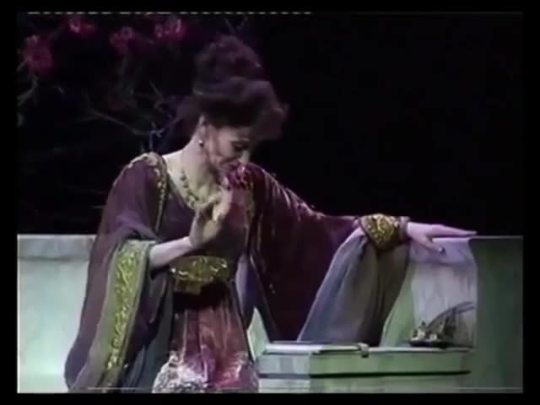
“I once wanted to be like you,” she says, literally waving away the entire idea. And what we get next is such an interesting way of calling Elisabeth to task. Of her calling HERSELF to task. At least if you’re with me on “this shit isn’t actually happening”. Otherwise, enjoy it as an adult woman and her dead father arguing like they were both fifty years younger (and also both alive).
For myself, much like with needing to filter her own creativity and joy through Heinrich Heine, Elisabeth can’t actually question herself and her choices. A question suggests uncertainty, a question is a weakness. Elisabeth has no room for that shit in her life, but that doesn’t just make doubts go away, and so she turns them into something she can argue against, in the guise of someone she loves and trusts, and who she most aspired to be.
If she holds firm against her father, the embodiment of her life’s hopes and dreams, she can stand firm against anyone. (SORRY ONCE AGAIN ABOUT YOUR LIFE RUDOLF)
“Why are you speaking with the dead?” Dad rather reasonably asks.
“What should I talk about with the living?” Elisabeth counters. She’s not living, after all, and the only true understanding she’s gotten came from Death.
"You are cynical, you are bitter and alone.”
“They trained me to be an Empress!” Translation: This is what they wanted, so this is what they get! It really helps to bring out the sheer fucking SPITE of it all in Elisabeth, and how in turn that spite has only hurt herself.
"To lock yourself away, you cannot be free.” Or, as I’m reading it, “BITCH YOU’RE DOING THIS TO YOURSELF CAN YOU TAKE IT DOWN TO A TWELVE OR SOMETHING JESUS FUCK”. He said, ghostily.
“I’m sick of everything,” Elisabeth says, in the closest thing I think we’ll ever have to her yielding a point.
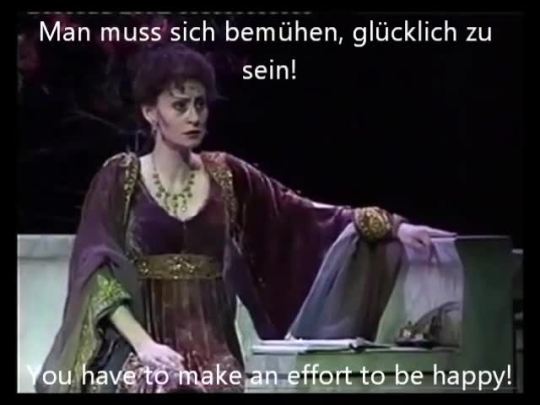
It was a rough job, not posting every single last glorious facial expression, but I finally settled on this one, because how can you properly convey the look of pure unsullied SHOCK on her face at this. “You have to make an effort to be happy!” Dad says. “I’m sorry what the shit?” Elisabeth’s face replies. Are you suggesting that I -- a mere unencumbered empress of Austria-Hungary, globally welcomed and adored, with enough finances to live in luxury every hour of every day for my entire life -- must PUT IN EFFORT??? DADDY HOW COULD YOU
Elisabeth gets up now, putting distance between herself and the poems she totally didn’t write and this entirely galling suggestion that happiness could be right there if she’d just fucking reach for it. “Why lie to yourself?” she counters, still insisting on her own misery.
Dad then reminds her how she wasn’t even this accepting of her situation when she was a child and ACTUALLY had no control over anything. “Maybe,” she agrees, before adding, “because I knew nothing of people.”
NO WONDER DEATH IS THE ONLY ONE WHO’LL CHAT TO YOU ELISABETH YOU’RE A FUCKING DOWNER
She and her father sing a bit more of their song from the past, but it’s a short-lived spark of joy. “Now, it’s too late,” she says.
:”Adieu, Sisi,” he replies, echoing what he would say to her in parting as a child. But the tone of it is completely different, undeniably carrying the weight of a goodbye. Be it her father or her own thoughts, this is the last time they will try. Elisabeth’s mind is set, and she will not be moved.
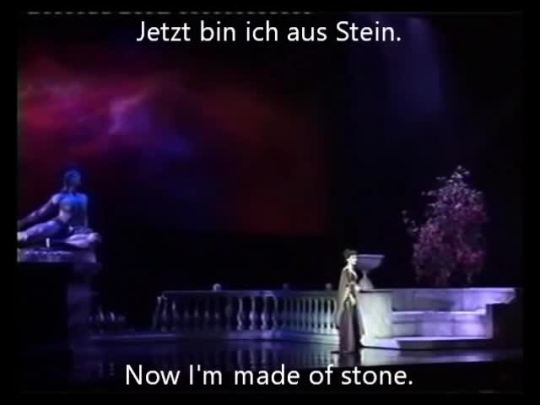
"I will never be like you,” she announces to no one, not vowing, just deeply resigned.
JUST IN TIME FOR RUDOLF TO ENTER WOW GREAT TIMING AS ALWAYS BUDDY
20 notes
·
View notes
Text
Happy Birthday x2, Elisabeth
Dear Elisabeth,
Well you see, I forgot that this existed for a year or so. My bad. It was your birthday last week. You’re not shy to tell anyone that you are THREE, which is insane. You’re so adorable (which is the word you insist we must use because you say you’re too big to be cute) and so sweet and empathetic. I’m just so proud of the little person you are becoming. I always knew you’d be cool, but you’re like, super rad. You insisted on a pink dinosaur party, so I hand made dinosaur balloons out of pink balloons and glitter paper for the limbs and heads, finishing them off with googly eyes. You thought they were the best things ever, so I was able to ignore the imperfections due to my inability to do any sort on fine motor skill with grace. Grandma Kathy made a super cool pink dino cake with a tie dyed interior and tie dyed cupcakes. Our house was full of people, and they were all there because they love you. As overwhelming as family get-togethers can be, it was heartwarming to see your great grandparents on your dad’s side and Great Grandma Cindy and Great Grandpa Jim, both of your sets of grandparents, all of your uncles, Uncle Z, and of course Aunt Catrina and her boyfriend, Collin (whom you adore right now) all under one roof to celebrate you. My friend Ashley and her son Emmett were there also to wish you a happy birthday.
This June we moved into what you call (still) your “new house”. It’s a beautiful tri-level, open floor plan condo in Oregon, WI a block away from a park. The community is so warm and welcoming that your Dad and I know we made a great move. Aunt Catrina also came to live with us, making the move more affordable for everyone involved. We took in one of Dad’s friends as he is what we call an “Epic runaway”. Your Dad made it about a year and a half before being asked to leave because he wasn’t willing to sacrifice all of his time with you for this position. We now work at the same company doing IT in jails. It’s not great, but it pays the bills and you get to see him a bit more often. Anyway, said friend of your dad is now Aunt Catrina’s boyfriend. Once they started dating, he pretty much immediately started sleeping in her bed, so they share a room now.
Uncle Z now has his own bachelor pad downtown. We miss him, but he still comes to visit regularly. In fact, the week after your birthday he braved your potty training self in his beloved Subaru and took you to ice cream and let you pick out some cool stuff at the teacher store. I cannot overstate how much you are loved.
Dad and I are trying so desperately to give you a sibling, which you continue to inquire about on a regular basis. It’s been about 6 months of trying now and we’ve experienced one loss. It was heart breaking, but at least it was before we had announced anything. We want for you to have a sister or brother, there’s nothing quite like that bond. Beyond that, I’ve always dreamed of having two children - no more, no less. Hopefully someday we can make that a reality. Dad has been traveling a lot, so that probably doesn’t particularly help the situation either.
Your personality is just so vibrant, it’s hard for me to get over it. You speak in paragraphs and chapters, and you have so many stories to tell. In the car on the ride to school, it’s always you, Dad, Aunt Catrina, and me, and you always pick a farm animal for three of us to be, and then the fourth is a duck. Every time. It’s hilarious. “Mommy, you’re the daddy horse. Ta (Aunt Catrina), you’re the baby horse, I’m the Mommy horse, and Daddy... you’re the duck.” We all make animal sounds, and you feed us pretend food. Dad gets especially into it with his animal sounds, despite the fact that usually he’s the one driving.
Your favorite food is yoodles (noodles). You love bananas, which you refer to as bayanas, and you’re quick to remind us that you would like berssert after dinner. You’ve just gotten out of the habit of calling unicorns “corns” which are your second favorite animals after dinosaurs (especially t-rexes and ‘ceratops) and just before flamingos “mingos” which you were for Halloween last year. Unsurprisingly, you are requesting to be a pink T-Rex for Halloween this year. I’m sure tonight we will watch one of your three favorite shows: Daniel Tiger’s Neighborhood, Sarah and Duck, or Dinosaur Train.
Your room is so stuffed with toys from family and friends that Dad and I decided to do an experience with you this year instead. We took you to the Great Wolf Lodge in the Dells. It’s a giant water park that is perfect for young kiddos. You were able to ride some of the slides by yourself even which was really fun. I got to catch you at the end. You loved the indoor splash pads, especially the stationary jet ski that had a water gun attached. Dad would eep every time you got him with the water gun and you thought that was hilarious. After the evening in the water park, we went to dinner and the arcade, and then Aunt Catrina took you to Build a Bear. Of course because it was just you and her, you talked her into, not just one, but TWO extra stuffed animals: Mingo (a flamingo), Chuck (the birthday bear), and Princess Bear (the... princess bear). Your room is going to explode. While you two did that, I snuck into Carters and bought you some adorable dino jammies. The next morning, we woke up at Great Wolf, had breakfast, and scooted back down to the water park. After a couple hours, you were waterparked out, so we went to Wizard’s Quest which is this giant room where you go around these fairytale/fantasy themed play structures and try to find the objects on the tablet they give you. It was pretty cool, but you were a little freaked out by how dimly lit it was. Dad almost got stuck in a tunnel out of a ball pit, which was pretty funny.
Both your Dad and I have been traveling a lot, and it’s been hard on you. You’re so sweet, but we can tell it upsets you that we left when we come back. I want so badly to be home with you, but it’s just not in the cards for us right now. I’m going to try to write more often -- then maybe you won’t be stuck reading a wall of text as long as this one. Just know that we love you so, so much.
Love,
Mom
1 note
·
View note
Text
Elisabeth: The Shadows Grow Longer
I spent no small amount of time into trying to organize and articulate my thoughts on “Hate”, and now I’m even further removed from that effort, I’m pretty pleased with what I managed to say about it. I can only hope, as I sit here on no less than my fourth purge-and-restart in five months for “The Shadows Grow Longer”, that I come to feel the same with this post, BECAUSE MY GOD HAVE I STRUGGLED WITH IT SORRY @iatheia
Given everything, I think this is my single favourite part of the entire musical. I love the song, I love the way it’s performed, I love the way it’s sung, I love the meaning behind it, I love how difficult it is. That gives me an extra layer of desire to get my discussion about it right, but as can so often be the case, it also makes me that much more critical about how I’m doing it.
So fuck it, another start from scratch. Fourth time’s the charm? LET’S HOPE
Essen Alternate Title: Sucks To Be Rudolf Zuka Alternate Title: Sucks To Be Whassisface Because Reasons I Guess
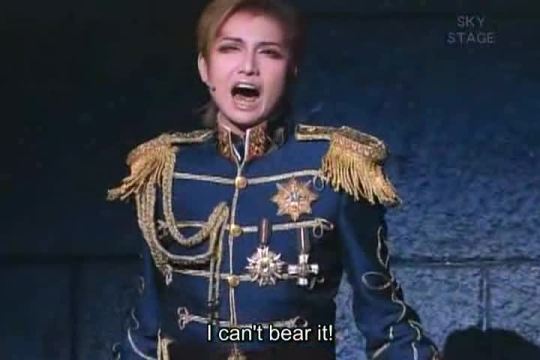
In “Hate”, I talked about how its exclusion from the Takarazuka version stripped this song of much of its relevance and meaning. Having just rewatched it several times, I hold firm to that. The performance of the song is fantastic, and its a testament to Rudolf’s actress that I felt tremendous compassion for him despite any actual objective show-based reason to do so. SHE’S JUST THAT GOOD.
The song itself in the Takarazuka version is actually a pretty close match to the Essen. It’s originally intended to be between Rudolf and Death, so there’s no shoehorning of Death. It also keeps its focus pretty firmly on Rudolf, rather than twisting things out of shape to put Death front and center. NOT A COMPLAINT. It is a bit of a pleasant surprise, though, given the predilections of the Takarazuka thus far, and I think speaks a lot to the strength of the “The Shadows Grow Longer” that it’s functionally untouched.
But damn, I just CANNOT get past how gutted it is without “Hate” as its lead-in. This song is functionally our introduction to Takarazuka Rudolf, the first time he’s spoken of himself and his feelings rather than through what Lucheni decides to tell us about him. The Essen version, by this same point, has put a comparative glut of time and effort into making sure we know Rudolf, but even without all that, if we have “Hate”, we’d at least have context for all this.
ALAS
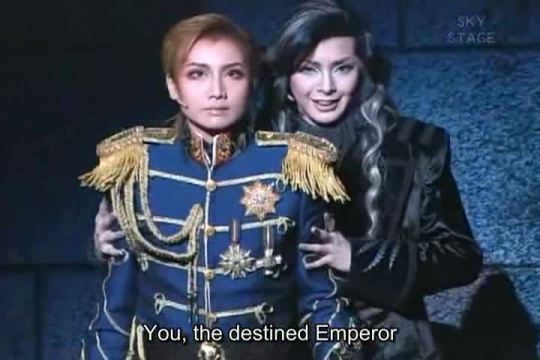
Instead of realizing that Rudolf is struggling to reconcile his personal desires to do away with imperialism and the larger picture of the chaos and power vacuum left in its wake, he comes across as a weak, pampered little boy, who wants to shirk responsibility and hug his mummy, and is desperate for The Cool Kids to like him OR HE’LL JUST DIE (literally).
Again, the Takarazuka actress infuses the song with so much more than that, and I’ll never stop giving her every credit for it, but it’s entirely despite the building of the material. Until I watched the Essen version, my take-away from this song was essentially “You don’t want to deal with all that emperor shit and the mess of the world, just shoot yourself and save everyone the trouble.”’

A consequence of how the Takarazuka version has rearranged itself with Death at its center, all this feels like none of it actually MATTERS as far as Rudolf is concerned, that it’s simply a ploy by Death to try and hurt Elisabeth. That’s a damn shame, when the scene is actually incredibly powerful independent of both Elisabeth AND Death, and serves as the perhaps the one fundamental link between mother and son that he so desperately longed to find.
On top of that, the Takarazuka puts so much of its energies into building Death as a singular obsessive character, rather than an alluring force both terrifying and comforting, that by pushing Elisabeth to the sidelines of her own story, it’s weakened everyone, INCLUDING Death.
Still though, the Takarazuka performance of “The Shadows Grow Longer” is awesome, and does a tremendous job showing Rudolf and Death in their own intimate dance as Rudolf’s struggle to resist Death’s charms and the freedom in oblivion he offers.
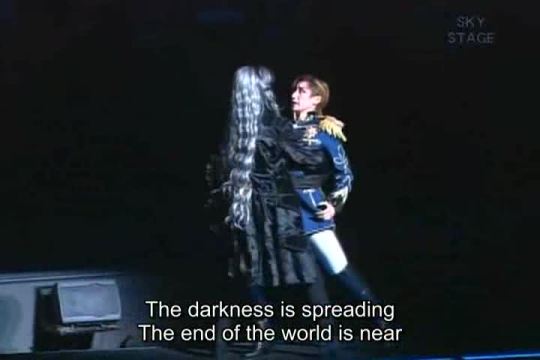
THE ESSEN VERSION THOUGH JESUS WEPT
I’ve rewatched it six or seven times so far today, in the course of writing this post, and I’m still getting goosebumps. The desperation and fury in Rudolf is nothing short of incredible to watch, and Death makes the perfect accompaniment to his torment.
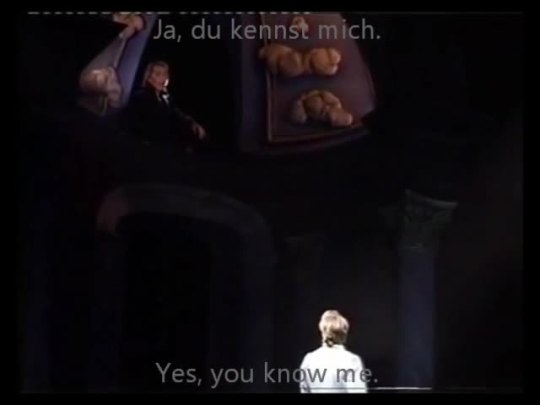
The way he says “Yes, you know me” is SO GOOD, carrying just the right note of sinister familiarity, and that’s only the beginning. From there, as Rudolf and Death sing together, we get a sense of the relationship Rudolf has with this force that doesn’t actually exist, and yet is more real and comforting to him than literally anyone else in his life, and if that isn’t some sad fucking shit then I don’t know what is. As Rudolf calls Death his friend, he says it with true joy in his face and in his voice. Death is his constant companion, always there for him whenever he’s afraid and alone, and it’s through this examination of Death and Rudolf that we can also better understand Death and Elisabeth. She never really allows herself to feel -- or at least express -- the soothing nothingness Death offers, yet still, she can never completely pull herself free. Through Rudolf, we can see how alluring it is, how reassuring to always have an escape hatch constantly whispering some small morsel of want and affection.
But it’s also terrifying. As Rudolf welcomes Death, Death threatens to consume him. They sing together, Death of course knowing precisely what Rudolf knows and so echoing to him his deepest fears.
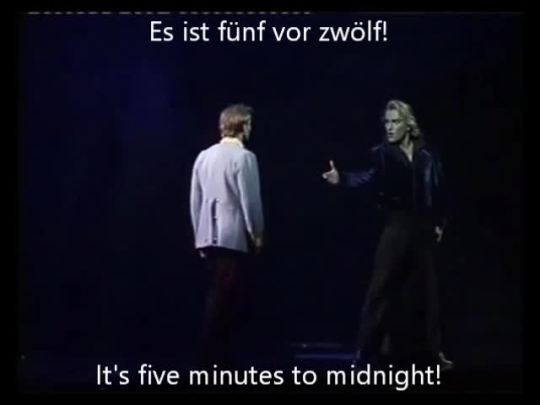
Rudolf can see how the world is moving. As demonstrated through “Hate”, he knows only too well that everyone is headed for violence and bloodshed, and critical problems will grow so much worse before they can even consider getting better. AND NO ONE ELSE CAN SEE, no one else is in his unique position of both (or neither) insider and outsider. Rudolf alone is at the crossroads of history, and knows that there’s almost no time left to try and stop this. Knows that he alone may have the opportunity to even try.
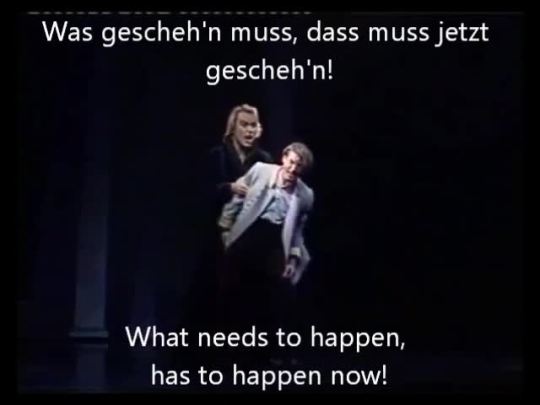
It’s that uncertainty of what to do and how to do it that ultimately proves too much, but he’s not quite there yet. Death appeals to him, entices him, coaxes him, even goes so far as to directly and physically manipulate him like a puppet.
Still, Rudolf tries to fight, breaking away time and again, only to repeatedly return to the only one who understands, the only one to offer him SOMETHING. And Death does, in a way somewhat unexpected.

I’ve turned this over a few times, thinking on how Death, who for most of the song is encouraging Rudolf to give up and accept the inevitable, now does a 180 and urges him to try, to embrace becoming both an emperor and a traitor. It seems, at first, to be something of a contradiction, but in truth I feel it highlights the utter impossibility of Rudolf's situation. He’s doomed no matter WHAT he does. If he stands by and doesn’t act, the world will turn down the path of hatred and unthinkable atrocities. If he keeps the path his ancestors forged, he sacrifices his personal values while condemning and further inciting the poor, bringing about the end of Hapsburg rule with himself its chief villain (and very likely doing nothing to halt the impending march of World War I anyway). He leaves this moment still trying to ride the middle, and of course history shows us how well that goes for him. But right here, right now, he’s encouraged to at least TRY, and in way that’s perhaps one of the saddest in the entire show.
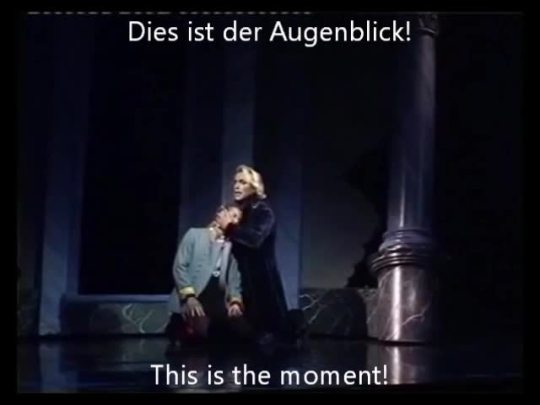
Rudolf, exhausted and despondent, falls (nudged every so slightly by Death) to his knees, wondering why nobody else can see coming what he sees. And Death joins him, tries once more to take him, but at Rudolf’s continued refusal to yield to Death, changes instead to comfort. They kneel together as Death cradles Rudolf’s head, and it’s the first time we see Rudolf in any state that could even slightly be described as relaxed. Someone’s comforting him, someone’s holding him, someone’s helping him, and that it’s DEATH ITSELF just crushes me a little.
But at the same time, Death is Death. He may give for now, but ultimately, he will take. Whatever motivations compel him, becoming emperor will kill Rudolf as surely as Death’s kiss. And as Death turns him to face his future, “Kaiser Rudolf” still lingering on their lips and ringing in their ears, Rudolf ultimately stands alone.

#jet wolf watches elisabeth#a novel by jet wolf#oh my god i can't believe i've finally gotten this done#WAS IT WORTH FIVE MONTHS OF WAITING PROBABLY NOT BUT HERE IT IS
24 notes
·
View notes
Photo

37 notes
·
View notes
Text
Elisabeth: Hate
Poking around at this one is a bit off-script, and I hope @iatheia won’t mind too terribly much that I’m being self-indulgent by going here. I think the sequence for “Hate” though is intensely well done, historically honest, and tonally vital to Rudolf’s character as we enter what is, essentially, his arc in the musical. It’s entirely missing from the Takarazuka version, and I think there’s a conversation to be had in its exclusion, and what responsibilities lie in an adaptation grounded in history. But that’s a conversation not for this post, so for now I’ll simply say that while I understand the Takarazuka version shying away from going here, I think it’s the strongest single example of hollowing itself out. When I was liveblogging it, and so lacking any other version knowledge to compare it to, I found Rudolf a paper thin character whose motivations I could never really wrap myself around. Now, having added the Essen version to my experience, OF COURSE I didn’t get him, I was never given the chance.
Which isn’t to say, of course, that the Takarazuka brought us nothing.

BECAUSE OH DID IT FRIENDS
For Essen Rudolf, however, we’re shown what he sees coming, we know what he knows will happen if he does nothing, and we do it all with the perspective of knowing he was absolutely correct. His struggle and eventual suicide becomes so much more sympathetic AND infuriating, complicating our feelings toward him and making him so more complicated in the process.
So yeah, let’s take a second for a little hate, shall we?
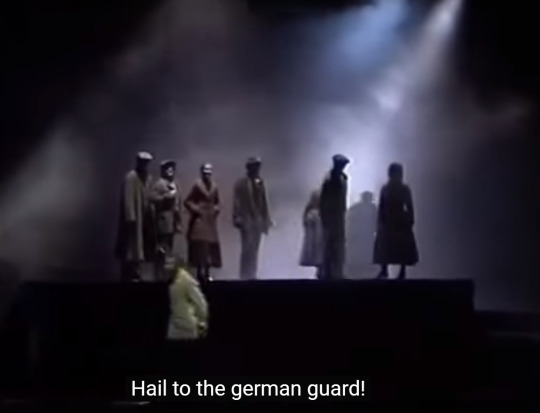
I really love how this is staged, I have to say first up. The chorus emerges from the mist on Rudolf’s repeating echo of “HATE!” They quickly consume the stage, and yet Franz Joseph doesn’t notice them, doesn’t hear, never sees. And that’s incredibly intentional. He doesn’t hurry off stage as this portion begins, he lingers, thoughtful on Rudolf’s words, then walks away, taking the full length of the stage, walking with purpose but very calmly. This serves to contrast in a really fantastic way with Rudolf at the end of the song, so keep this in mind as I’ll touch back on it in a bit.
There is, I have no doubt, a metric fuckton of historical significance and nuance here that I’m not getting. WIKIPEDIA CAN ONLY FILL IN SO MANY GAPS. World War I is a spotty and sketchy thing for most Americans. It’s a complicated clusterfuck that’s not so easily put into “good guys” versus “bad guys”. IT’S A LOT EASIER TO KNOW YOU’RE THE GOOD GUYS WHEN YOU’RE SHOOTING NAZIS. (Though let’s stand in awe of how that’s becoming a more controversial statement every day.) (WOW I’M DEPRESSING MYSELF OKAY BACK TO THE MUSICAL)
My mother and her side are all English, so I’d heard stories about WWI in ways that it impacted my family. I did a bit of reading, because sometimes I like to know things. And I’ve tried to refresh myself and build more knowledge after having watched the Takarazuka, so I’d have more context. But still, I feel I know basically fuck all, so I’m pretty sure lots of details will fly over me. There’s a lot to get here though, even in the broad strokes.

The space left by Franz Joseph as he exits the stage is quickly filled with demonstrators calling for a stronger leader. I SEE YOU MUSICAL. It quickly gets worse.
Hate and violence to those who aren’t with us and those who spread here we will chase off!
NATIONALISM IS A HELL OF A DRUG KIDS. If you aren’t INSERT COUNTRY HERE, GTFO, and then it gets better!
With socialists and pacifists we won’t waste time anymore!
The Jewish writers and the Jewish women will be our ruin!
If you aren’t the right KIND of countryman, a “real” citizen with the “correct” thoughts and values, we’re coming for you, too. And what’s that? Ahh, the delicate fragrance of rampant antisemitism wafting on the breeze! I’M SURE THAT WON’T HAVE ANY PLAY IN FUTURE EUROPE.
I do think it’s interesting though, in like a desperately efficient and terrifying way, how they very specifically drill down that antisemitism to Jewish writers (the spread of ideas) and Jewish women (the spread of people). It encapsulates the utter blinding hatred of Jews so well that I both admire the writing skill and feel sick at the same time. Kudos? I guess??
The demonstration continues. The hate builds. More and more people join on-stage. The lighting gradually increases, the chanting grows louder. No longer whispers in the shadow, but heart-felt declarations made public.
It’s legitimizing. It’s spreading.
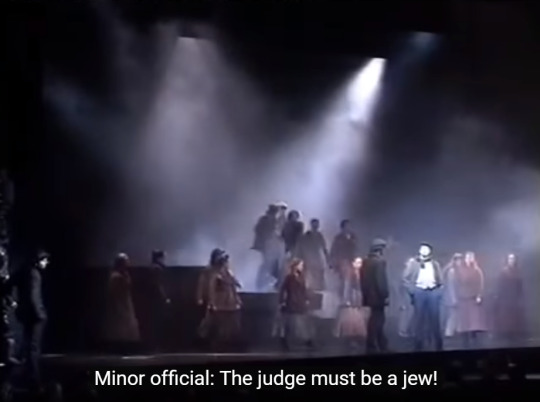
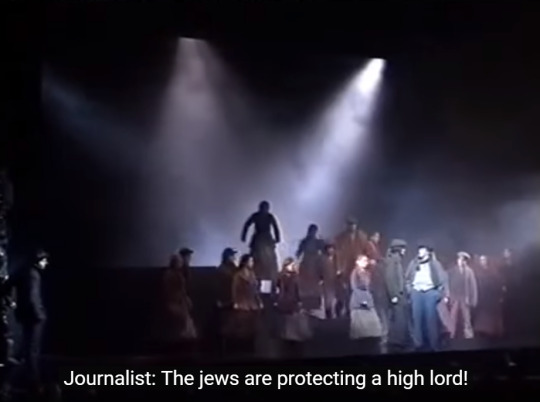
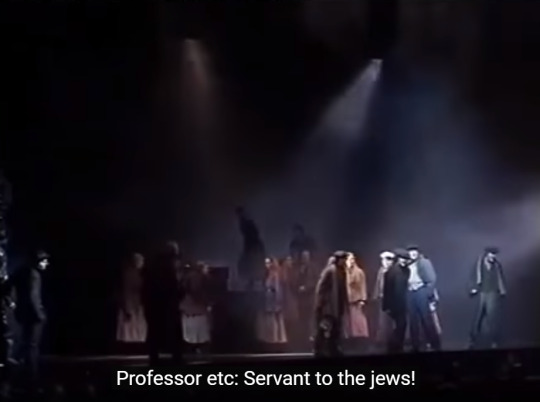
Now not just “demonstrators”, but government leaders, reporters informing the public, educators teaching the next generation. So that’s awesome!
Someone wanders through all this and wonders what’s going on. Lucheni joins him and answers, and I’ve spent a bit of time on why Lucheni, and why now. To this point, he’s been lingering on the fringes. As our guide and narrator, he’s outside of time, with the unique perspective of how all the pieces fit together. I think he’s coming in now as a critic, with his usual mix of irreverent anger, to very directly condemn what we see building. Which may seem like a no-brainer, but I’ll point out again how fucking relevant every second of this is to the world right now on this beautiful day in May 2019.
ANYWHO, the passerby wonders what’s going on. “A demonstration, signore,” Lucheni explains. “Nationalists, antisemites, supporters of Schönerer.”
(“Who’s Schönerer?” I innocently asked Wikipedia. “HITLER’S INSPIRATION.” Wikipedia replies. “oh.”)
“Outrageous!” the passerby says, visibly startled by this news.
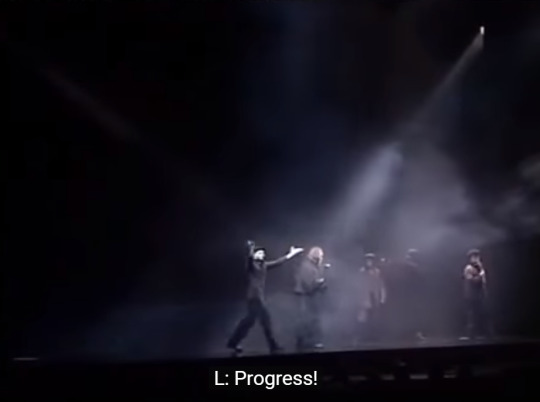
“The 20th century. It’s approaching!” And with this, Lucheni walks off-stage, paying no mind as the passerby is viciously beaten with his own cane by the demonstrators.
Those demonstrators once again swarm the stage, spitting at the beaten passerby and reiterating their core mantra: “Hate and violence to those who aren’t like us! And those that spread here, we will chase off!” Question them? Express the slightest hint of disagreement? Hate and violence!

More chilling, the demonstrators are no longer just a gathering of individuals. They’re beginning to march in formation, literally falling in step together.
They’re organizing.
Lucheni takes center stage again, but this time it’s just him. The demonstrators are still present, their voices responding to him from the darkness, but otherwise, he stands alone.
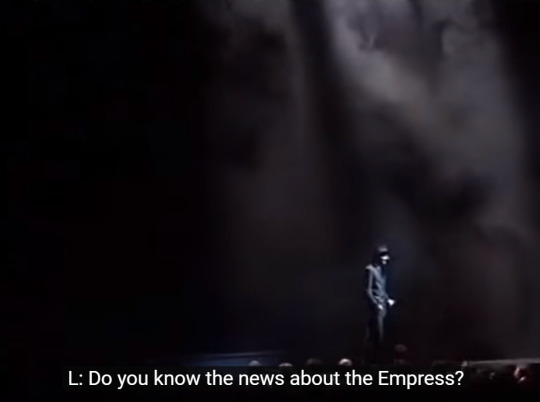
AND BRINGS ELISABETH BACK INTO IT
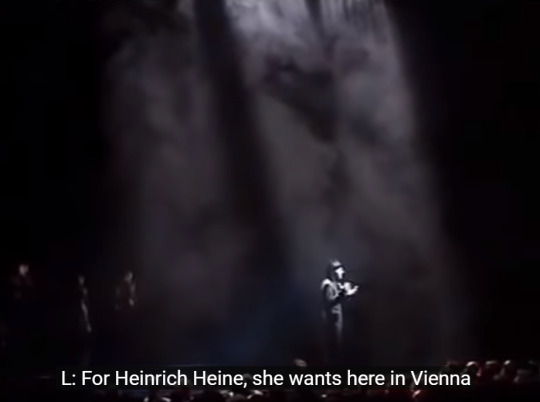

Again, I’ve spent a lot of time thinking about why the show uses Lucheni here and now. Setting aside my massive ignorance YET AGAIN, I’m not finding anything that indicates Lucheni was particularly antisemitic (the “problem” with Heinrich Heine? I’LL GIVE YOU ONE GUESS.). Lucheni may well have been, but, you know, in a low-key chill sort of way. By which I mean, his deal seems to have been first and foremost about anarchy, not antisemitism or racism. So why have Lucheni be this voice? Why this protest?
And my thought is that we’re dipping for the moment into the “real” Lucheni, rather than the version who’s been taking us on this journey. Or, perhaps another way to look at it is that he represents the growing anti-imperial anarchist movement of the time. He/They may not have specifically been antisemitic, but they were more than happy to wield antisemitism as a tool for their own ends. Fan those flames, and give zero shits about who gets burned.
I think this may be the strongest indictment of Lucheni/anarchists in the musical. Throughout, I feel it mostly comes down on the side of ... if not sympathy, exactly, then of understanding. Elisabeth is complicated, and so, too, would be the feelings about her, particularly for the common people who, as a group, both adore her and suffer at her whims. But Lucheni taking voice here, whatever his motivation, is siding with and inciting those who embody hate and violence, who we know will perpetrate unthinkable atrocities in that name of that hate. The musical doesn’t turn away from the culpability that Lucheni, and those like him, have in not just allowing this but enabling it, ENCOURAGING it.
His piece said, Lucheni runs off-stage, back into the shadows as the demonstration reaches fever pitch.

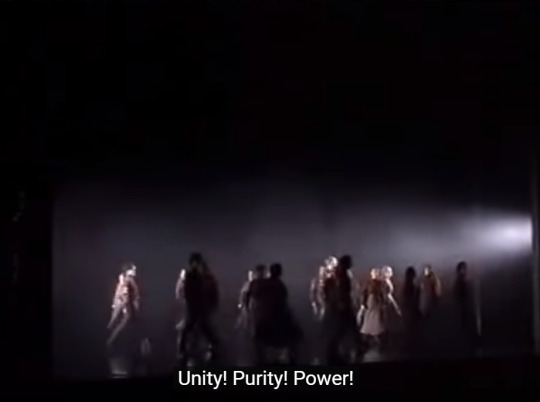
They march toward the front of the stage, furious but orderly, chaos but contained. The chanting continues, but the marching changes. It becomes a goose-step. There are elaborate hand gestures, and still they all move as one. Finally, it concludes as it must.

The lights slam up, then drop, leaving only one figure on stage.

Rudolf, alone. Not walking past all this like his father, but staring at it directly, unable to look away.
This is what Rudolf sees in their future. Not just the fall of the Hapsburgs, but house after house throughout Europe, the suffering of people in the wake of those conflicts and power vacuums, setting the world stage for even more horrors to come. He KNOWS it’s coming, he can hear it, and the burden of what to do about it falls squarely on his shoulders.
“Hate” is so crucial, I feel, to understanding Rudolf’s thoughts and actions to come in the musical. Without knowing what he sees (things which we know to be true), his motivations against his father make no sense, his longing for some kind of understanding and comfort from his mother make him seem emotionally undeveloped, his desperation lacks weight, and his suicide is reduced to a plot point for Elisabeth rather than the final surrender of hope that we could avoid the inevitable.
And it’s so well done! Really, the way the whole sequence just builds and builds, before abruptly cutting off at this evocative moment, leaving Rudolf its only witness. Just fantastic, I loved it.
IT TOOK ME LIKE A MONTH TO GET MY THOUGHTS TOGETHER TO WRITE THIS POST. One that wasn’t even requested, but again, I hope no one minds too terribly much that I took us down this detour. For as much as I carried on about it, it’s just under two minutes, and if you have those two minutes to spare, I would encourage you to put them here.
youtube
24 notes
·
View notes
Text
Elisabeth: Kitsch
SO EXCITED TO DO THIS ONE. This didn’t wind up being my favourite song from the musical, but I think it comes a very respectable second. The Interplay between the history and the FEELING of history is so interesting to me, the way that we soften the edges to fit the things we’d rather learn.
Perhaps more than any other, this is Lucheni’s song. He fulfills his usual role, bridging the scenes with the relevant high points, but it’s in this one where I feel he shines brightest. And that’s true, despite the fact that the Takarazuka and Essen versions come at it in very different ways with very different messages. Even with the lighter and less critical spin on the song, this is Takarazuka Lucheni at his cheeky best.

And as for Essen Lucheni, his anger for the aristocracy is perhaps outdone only by how much he hates each and every one of us for buying what they sell.
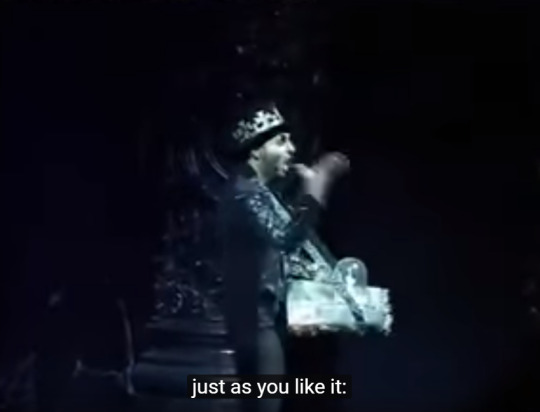
Both are great versions of the song, particularly in the story that they’re choosing to tell. SO COME LET US EXPLORE
Even just a cursory viewing of the two performances show how dramatically different they are in what they’re telling. The most important information we need to learn is how Hungary is becoming Austria-Hungary with Franz Joseph and Elisabeth as its rulers, so in this, both versions are the same. Both also, in a very broad way, look to strip Elisabeth of her mystique somewhat, but with very different ideas of what that means.
The Takarazuka version is almost entirely focused on Elisabeth’s beauty and her obsession with it. As I’ve been watching the two versions much more closely for these posts, it’s a recurring trend I’ve noticed where the Takarazuka makes changes. The song in the cafe, for example, has the patrons commenting specifically on her waist size and diet. (My guess is that this is a cultural choice meant to highlight something specific about Elisabeth, but I don’t have that perspective to extensively comment on it beyond noting it, and how those changes affect my personal relationship with the songs.)
Elisabeth, Takarazuka Lucheni tells us, has assigned diplomats throughout the world to send her pictures of their stationed country’s most beautiful women.
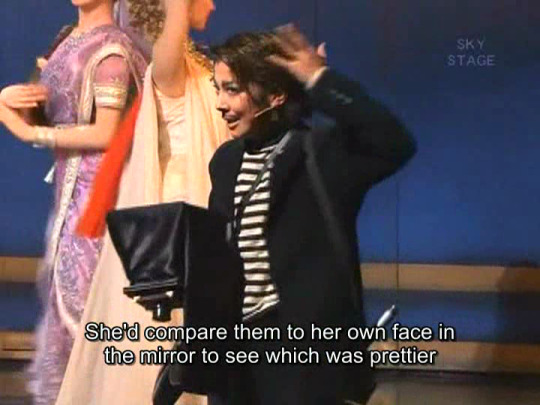
“She knew well that beauty fades and strength fails.” It’s a great line and probably the most critical the Takarazuka version gets of Elisabeth. Though I have to note that it comes right before discussing how Sophie is still in control in Vienna, and coupled with how Sophie will be shown fading shortly, I wonder if the line isn’t as much commenting on Elisabeth’s strategy against her rival as it is awareness of the expiration date of her own primary weapons. POR QUE NO LOS DOS
We also have this, which is wonderfully cynical and true.


It’s also a brilliant example of how Takarazuka Lucheni delivers that cynicism: slyly, like he’s sharing an in-joke with us. OH THE RICH AND POWERFUL WE SURE KNOW WHAT THEY’RE LIKE DON’T WE THOSE SCAMPS
This entire number in the Takarazuka version is ITSELF a fantastic example of the kitsch it sings about. The ladies are in hilariously overdone “national” costumes that border on offensive. They parade back and forth, representing everything but saying nothing, much like the gesture of Austria “joining” with Hungary. I still can’t decide if I think this was an intentional turn by the creators adapting the musical for Takarazuka, or a delightful side effect, but it’s a spectacle and I enjoy it either way.
The Essen version, though. The Essen version is here to slaughter everyone and it is gloriously full on its shit.


Essen Lucheni comes out swinging and socks you right across the jaw AS YOU WELL DESERVE. Much like Takarazuka Lucheni, he begins by interacting directly with the crowd. He’s not taking photographs though, not capturing the moment, he’s handing out fliers. I don’t know what the cards were, but I hope hope hope they were advertisements for what was on sale in the theater lobby. Either way, in the act of handing something out and the audience members taking it, we’ve become part of the performance. We’re complicit now, we’re willing customers.
Without pause, Lucheni begins. He sings before a dark backdrop, the inside of the cathedral where all the action is taking place. We can’t see, as those gathered at the actual moment would be similarly excluded. BUT WE’RE STILL HERE. We’re near the significance, and that’s good enough. We buy a token, proof that history happened near us, a cheaply made lie that assures us that we mattered.
Lucheni would rather sell us the truth, but we’d never buy it.
The Essen actor for Lucheni is really incredible. He’s not as likable as the Takarazuka actress (WHO AMONG US COULD), but he’s also not trying to be. What he is is darkly funny, devastatingly insightful, and FURIOUS. Even knowing that Lucheni will kill Elisabeth, I spent most of the Takarazuka version actively looking for the point at which he “turns”, a specifically placed marker for the murderer we know he will become. I never found it. OH I SPECULATED A LOT. There was nothing to find, though. It wasn’t seamless so much as it was a switch flipped, and suddenly Lucheni was a sniveling minion keen only to do Death’s bidding.
There’s never a question in the Essen version. I completely believe that if Elisabeth appeared in front of him at any point in the story, he’d shank her again, every single time, with whatever he just happened to have on hand. Nothing but a Playbill? THAT’S FINE I’LL MAKE IT WORK.
But as I said earlier, Lucheni’s rage is wide and deep enough for us all. “Kitsch” is doing several things, but none so much as it’s yelling at humanity past, present, and future, for lifting Elisabeth (and any rich powerful fuck really) to this level of uncritical, adored deification utterly removed from who and what she truly was.
ELISABETH IS STILL ON SOCKS AVAILABLE FOR PURCHASE IN THIS THE YEAR OF OUR LORD TWO THOUSAND AND NINETEEN
“People only hear what they want to hear,” Lucheni says in disgust, “and so what remains after some time from beauty and from shit, from dream and reality...”

A quick aside to say how much I love the background lights coming up briefly on Lucheni’s “Kitsch!” cue to reveal all the spectacle we’re not part of. But it’s a glimpse, a tiny taste to entice us to come back next time.

I feel I could keep pulling stuff out of this performance forever, but there are a great many more scenes and songs to go through yet. I’ll leave this here, then, the Essen version of this song. It’s just over three minutes, and even without more context than I’ve given in this post, I think it’s well worth your time to check it out.
youtube
There’s one more thing I feel it’d be disingenuous of me to not comment on, which didn’t quite hit me until partway through this post. I’ve said a few times now, how the Takarazuka version is the same play, but also really not. It goes out of its way to pull a lot of the complexity from Elisabeth as a person and a character, and in overall tone is generally uncritical and much lighter, choosing to primarily become a fairy tale style love story. There are several conversations that can be had in that, about that degree of story alteration, where the line is between history and fiction, how far that line can be bent, and a dozen other topics.
This thought isn’t anywhere near that deep, don’t worry. But I do think it’s extremely interesting how the Takarazuka version of Elisabeth is, in nearly every single way, the "heartfelt, sweet, and sensible” thing Essen Lucheni is furious with us all for doing in “Kitsch”.



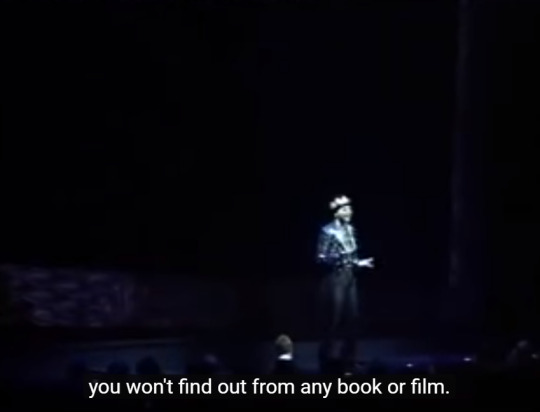
And finally, I love how the Essen version includes this moment of intense self-awareness. What a good fucking song.
KITSCH!
37 notes
·
View notes
Photo

THE SHIRT
THE SHIRT
IT’S LIKE IF A ROLL OF SILK AND A PEACOCK HAD A GLORIOUS SEQUINED BABY
#jet wolf watches elisabeth#i actually yelled my delight#i would wear this at least once a week#what for WHO CARES WHAT FOR
40 notes
·
View notes
Text
Elisabeth vs. Elisabeth
I feel a bit of an overview on the differences I found in the Takarazuka and Essen versions would be a good starting point for these posts, as they are numerous and intense, and so much more than just focusing on one song or scene. They’re both about the same story, with the same characters, and the same music, and the same lyrics (KINDA SORTA), but they’re also both entirely different from each other. So when we compare the two, it’s not like we’re looking at the 1960s original Psycho versus the 1998 shot-for-shot remake. This would be a bit more accurate:

They’re technically the same thing, BUT ALSO SUPER NOT, and that only makes it all the more fascinating.
COME THEN FRIENDS
ELISABETH CAN BE STRONG
I knew I was in for a different kind of experience the moment we opened the show. This is how we first meet Luigi Lucheni in the Takarazuka version:

The stage is fairly well lit, casting shadows as though it’s coming through bars. Lucheni strolls back and forth, caged and manacled, but otherwise free. His demeanor switches between irritated and amused, with a heavy dose of the fantastic mugging that made me love him immediately.
The Takarazuka version sets out from the beginning to be entertainment, first and foremost. We’ll learn a thing or two along the way, perhaps leave with a question nibbling at the edges of our thoughts, but those are all really quite secondary to the primary purpose: To Have A Good Time.
THEN THERE WAS GERMANY, who has never been interested in anyone having A Good Time ever.
The Takarazuka and Essen versions follow the same storyline path, so again, the first character we meet is Lucheni. See if you can spot the differences!

If you said “The stage is pitch black other than Lucheni dangling from a hangman’s noose while shouting angrily” CONGRATULATIONS AND WELCOME TO THE GERMAN VERSION. This take on Lucheni holds throughout the musical. Where the Takarazuka version is played very snide, I’d say almost tongue in cheek, the Essen take is darkly cynical. Essen Lucheni bridges the scenes and offers commentary as well, but it’s all with an air that’s furious, even dangerous. He’s showing us the past and suffering in “the present”, but still he’d happily shank every last one of these bitches.
This carries through to the end as well (which will be its own separate post so I won’t go into it too much now), where Essen Lucheni is more an agent of Death than a slavish devotee as in the Takarazuka, part of the narrative sacrifice to romanticise Elisabeth and Death.
Which, surprise, is another huge shift between the two, and apparent as early as their first meeting, after teenage Elisabeth has fallen from the tightrope/trapeze. In the Takarazuka, we have Death falling in love with Elisabeth, and pledging to follow (STALK) her she loves him too.



Elisabeth in this version is more a passive participant in Death’s plan. She calls out to him, and her song is about how she recognizes him and notes (though implied) how special their relationship already is because he showed himself to her. Death’s reactions to this, as well, suggest the “true love” between them, with Elisabeth being the only one to truly see and know him.
“Wait, a LOVE story??” the Essen version seems to say. Not that there’s no connection between Elisabeth and Death, quite the opposite. There’s a particularly evocative moment in this scene, in fact, where Elisabeth lifts her arms in a gesture of freedom, and despite being across the stage, Death is compelled to move with her.

But in whatever relationship they’re forming here, Elisabeth is the aggressor. Death, in fact, is completely silent in this song (a song that I would says in the Takarazuka version belongs to Death). Elisabeth alone sings, and talks about how it’s in Death that she felt like she could be the person she’s desperate to be.



This will set up what I feel is one of the primary themes of the musical: what it means to be free. Only, in the Essen version, it becomes more realized.
Not really a surprise, as the Takarazuka musical juggles the storyline (sometimes outright changing it) to accommodate its preferred focus as a tragic love story. It’s a shift of intent extreme enough that the musical really needs a wholesale rewrite, which absolutely does not happen. So some bits are changed while others are left, and the holes that causes are happily ignored. Elisabeth doesn’t really work as a love story because it ISN’T one.
Which, it’s important to keep in mind, is somewhat the point. There’s a lot to compare and talk about between the two versions, but at the end of the day, they’re trying to be something different. I don’t think ti’s unfair to say that the Essen version has a much larger scope of intent than the Takarazuka version. It explores different themes and lets its characters be complicated and kind of awful in a way that there really isn’t room for in the Takarazuka as, if you recall, it’s really mostly out to have A Good Time.
Before I wrap this up, I’ll say that I, personally, preferred the Essen version to a not insignificant degree. And I REALLY enjoyed the Takarazuka version! I found the writing to be much tighter in the Essen production (not surprising, as it’s about what it was always meant to be about), the ideas deeper and more challenging, and the things it’s trying to say interesting and difficult. But you know, I had TONS of fun with the Takarazuka, found the characters more likable (and sometimes more sympathetic), and more than once preferred its staging. So I’ll probably be “harder” on the Takarazuka, but mostly from the perspective of the Essen shooting out the gate with higher aims.
BUT ENOUGH OF THAT. My prologue’s done, onward to specifics!

31 notes
·
View notes
Photo

Said Death, the least monogamous entity EVER.*
(*) Zeus, greek god of lightning and boning, is an outlier adn should not be counted
34 notes
·
View notes
Text
Elisabeth: The Last Chance/Malady
Essen Alternate Title: “Surprise Bonus Syphilis Oops” Zuka Alternate Title: “YOU SHOULD DIE”

This is another short song, mostly bringing to bear Franz Joseph’s mermaid sexcapades, opening the door for Death to once again ask Elisabeth to the Sock Hop, and Elisabeth telling everyone to fuck off because she needs to take a walk for the next twenty years.
Once again the Takarazuka and Essen versions are dramatically different, which surely comes as a surprise to one and all. The framework is essentially the same: Elisabeth pursues her true life’s goal to be a carnie and collapses. Her attendants call for a doctor, who is also Death. This is literal in one, it’s metaphorical in the other, and as you might have guessed, it’s about here that the two versions of the song part ways.
Let’s talk first about the literal and metaphorical Death part, shall we? I admit I’m taking a few liberties with that claim; the Essen version could also be Literally Death, but I think it’s open enough to interpretation and more in keeping with the ideas of how Death is handled and interacts with Elisabeth that he’s personified, but never truly real. Death is a concept that Elisabeth is enamoured and tempted by, rather than A Real Dude.
The Takarazuka version has no such questions. DEATH IS REAL AND WANTS ELISABETH AND ALSO HAS AN AMAZING WARDROBE. We know the doctor is Death from the second he walks in, and we even take a moment to pause on that fact before the song starts, as Death lingers by Elisabeth’s side, partially reaching out, wanting to badly to touch her (take her?), but resolving to stick to his plan.

Essen Death, whose visage is more shrouded (though they’re not exactly trying to hide him) pretty much gets right to work, reporting what he’s observing in Elisabeth with a clinical kind of detachment feels entirely correct.

Ultimately, the greatest significance in Death’s presence from the start lies in manipulation of Elisabeth. Takarazuka Death has a VERY specific goal in mind with this visit: to expose Franz Joseph’s affair(s?) in an effort to break them up. He prays on Elisabeth’s devotion to Franz Joseph (wait, her what?), specifically talking about why she’s been pretty much starving herself to death.


Which is ... an interesting way to go with this. By that I mean, what the fuck? Particularly within the context of what the Takarazuka already altered. In our last post, for example, we talked about how “Kitsch” chooses to focus on Elisabeth’s obsession with studying the beautiful women of the world so she can stay ahead of them, also drawing direct lines that Elisabeth’s power lies in her beauty and charm. Coupled with how we’ve had her repeatedly pulling away from Franz Joseph and wielding his love for her as a weapon (SHE LITERALLY HAD AN ENTIRE SONG ABOUT THAT), the claim that she’s doing all of this to attract him comes completely out of nowhere. The only thing that makes less sense is that when confronted with his infidelity, she cries “I can’t live with this!”
Don’t worry, though. Death is here and ready to make betrayal SEXY.

I have no idea how you refuse anyone wearing that shirt. Elisabeth, you are a stronger person than me by far.
When Elisabeth realizes it’s Death and not the doctor (how hilarious if she thought the doctor was saying all this to her though), her mood whips back around to defiance.

That only actually means anything if her heart were open to him up to this point, but literally every other action we’ve seen from Elisabeth says otherwise. Which is really the heart of the problem with this scene in the Takarazuka version: IT DOESN’T MAKE SENSE. It feels, from where I’m sitting, that they’re trying to bend this around to make Elisabeth a tragic blameless victim. The problem is, she’s NOT, and the story just can’t hold up with that as its premise.
Beyond the character holes and vacillating motivations that this version of the song leaves in its wake, it also sucks out all the power. Elisabeth essentially resigns herself to Death being stronger, saying he can go ahead and take her if he wants, but she’ll never love him. That stays Death’s hand, but before he leaves, he shows Elisabeth a dagger (possibly the same she nearly used on herself earlier, I’m not sure), promising her that the day will come when she wants to die. Here’s one of the final images of the scene.

Elisabeth is staggered, nearly doubled over on the couch where earlier she was lain. She looks as if Death’s words were a physical blow. By contrast, Death is walking away, back straight, head high. He lets the dagger drift behind him almost casually, blade pointed at Elisabeth, just waiting for her. There’s no question who has all the power here. You could know nothing about the story around this cap, and you’d know.
I’m jumping way the hell forward here, but let’s compare it to one of the final shots from the Essen version.

Jesus wept, this is some different shit. We’ll look at how we got here in a minute, but again, just the image itself is everything. Elisabeth is the one standing this time, tall and resolute. You can’t tell by looking at her that she’s the one saying “Go!”, but one look at Death makes that clear (you don’t even need the subtitle, I just couldn’t get a cap without it). Even though he’s technically above her, he’s reaching out for her as desperately; the personification of Death, and he can’t hope to touch her. He’s leaving, but not because he wants to, because she’s driving him out, by no more than standing there and telling him to fuck all the way off. I think if you had to summarize the difference between the Takarazuka and Essen versions in two caps, these would be them.
It’s not the entirety of this scene, though, we walk several different paths to get here. As I said above, things diverge sharply when the doctor arrives. The doctor in the Essen version is pretty straightforward and unremarkable, really. Pretty quickly, he notes Elisabeth’s symptoms (no mention of her diet, no mention of her husband) and reaches his conclusion.

CONGRATS IT’S AN STD
He does suggest that she got it from Franz Joseph, which in my “the doctor wasn’t literally Death” theory marks the point where I think he enters the equation, BUT WE’RE NOT HERE FOR MY IRRELEVANT PET THEORIES ABOUT MINOR UNIMPORTANT DETAILS. Essen Elisabeth’s response is immediate and vastly different from her Takarazuka counterpart.


It’s all about her or, more importantly, her reputation. Ahh, character consistency! This makes every kind of sense to me, given what we’ve seen of Elisabeth so far. The power she’s managed to amass for herself depends almost entirely on the public’s perception of her and, fair or not (IT’S NOT), a woman with syphilis -- even if she got it from her husband who literally got it from a prostitute -- is going to be regarded extremely differently than a man with the same disease. Franz Joseph has managed to hurt Elisabeth far more than he could’ve dreamed possible, it just isn’t because of heartbreak (or at least not primarily).
She goes on to say that she’ll leave him, but then immediately thinks of suicide instead, which is a “solution” that’s nipped at Elisabeth’s heels from the start, so isn’t particularly surprising. This is when she hears Death whispering to her, encouraging her to do it, promising her the freedom she’s craved her whole life.
Elisabeth’s response to this is as immediate as it is unwavering.

Franz Joseph doing Elisabeth dirty is a blessing, she says, because now she can do whatever she wants without being hedged in by duty or responsibility, and he won’t be able to say a good goddamn thing about it.




“Go!” Elisabeth commands, and that’s where the scene ends.
Even as Essen Elisabeth says she’ll kill herself, she’s never diminished by what’s going on around her. Not by the doctor’s diagnosis, not by Franz Joseph’s actions, not by Death’s manipulations. It’s such a stark difference from Takarazuka Elisabeth, who, even as she tries to seize the moment and make it hers, is once more subjugated by Death’s obsession.
BREAK THE CHAINS ELISABETH
BUT MAYBE FIRST TAKE SOME PENICILLIN FOR ALL THAT SYPHILIS
23 notes
·
View notes
Quote
I like how the end of the first half is Death going 'I'm obsessed with you!' and Elisabeth going 'I'm also obsessed with me.'
Doc, bringing the best commentary
29 notes
·
View notes
Photo


27 notes
·
View notes
Photo

Or, rephrased:

27 notes
·
View notes
Photo



49 notes
·
View notes
Text
Elisabeth: All Questions Have Been Asked
Our specific scene dissection begins with the song “All Questions Have Been Asked”, or, “Elisabeth and Franny JoJo Get Hitched”. It’s the same song in the Essen and Takarazuka versions, but in the same way that “Under Pressure” and “Ice Ice Baby” are the same song. Everything about it is different, from tone to intent to even who’s singing the damned thing.
We start out different immediately. The Essen version goes from Elisabeth and Franz Joseph’s love song to this one with only enough pause to get the stage ready. The Takarazuka version, perhaps partly by similar set needs, transitions between the two with a watercooler chit chat between Death and Lucheni.


This back and forth between them is something from the Takarazuka that I genuinely loved, but it has the side effect of making Death and Lucheni’s relationship deeper. NOT SOMETHING I USUALLY WOULD PREFACE WITH “BUT”. The problem is that it all builds to a feeling of something specific and calculated between the two that never bears fruit. Killing Elisabeth (specifically) wasn’t even on Lucheni’s mind when he left the house that day; he was down to stab any monarch, and Elisabeth was just unfortunate enough to be in the wrong place at the wrong time. The Takarazuka version feels like it’s going somewhere with all this though, so when we finally get to the end, it’s all a little muddied and unsatisfying.
Similarly, the Takarazuka take on this song once again gives it to Death, whereas in the Essen version, he literally just drops in at the end to be foreboding for a second before fucking off again. But I jump ahead a bit.

Death, Takarazuka says, isn’t just watching the wedding, but officiating it, directing it, binding it. This sets a feeling about this union as one cursed by Death, as part of his infiltration and punishment for Elisabeth not .... what, exactly? Well, that’s part of the larger problem. Death claims to want Elisabeth to want him, essentially, and then “curses” her for not doing that. Fuck dude, she was all about it when she took a header off the tightrope, you were the one who got all “NO YOU DON’T WANT IT THE RIGHT WAY” about everything, you dramatic disaster personification. Elisabeth and Death’s “love” being the central storyline both narratively and emotionally just doesn’t really bear out with everything else going on.
But back to this scene. When I was first liveblogging it, I loved the way it was presented. The use of the organ, the chorus complicit in their own prophesied downfall, the use of the church setting to mark the simultaneous beginning and end.

All that holds, I think it’s really well presented. There’s a HUGE change, though, that I feel is an interesting -- and unfair -- choice by the Takarazuka.


Death spends the song singing about how everything is set to come crashing down around everyone, and concludes the whole thing by telling Elisabeth DIRECTLY that it’s her fault. And everything Death says is echoed by the gathered crowd, who also sing out Elisabeth’s name, condemning her for what’s to come. Put into the larger context, it specifically implies that this ruination could’ve been avoided if she’d just chosen Death (or NOT chosen Franz Joseph, depending how you look at it).
All of which is utter bullshit. Revolution was coming, slowly but surely, and it was on the backs of generations of rich assholes not giving a single fuck while their people starved and died in the streets. Elisabeth didn’t HELP, what with her milk baths, and by being a “celebrity” she may have been a flame for hate to gather around, but this clusterfuck was a group effort, no question.
The Essen version avoids all of this messy finger pointing by not even going there.
Once again, it’s different from the outset. Setting aside the absence of narration intro by Lucheni, the Takarazuka version is revealed to the audience fully formed. The lights come up, the sets are whole, the players are in position.

In Essen, they begin by literally laying out the scene.

Death’s helpers (who I will continue to collectively refer to as “The Toddettes”) lay down the red carpet (not coincidentally looking like blood). The nobles enter the scene, and in a touch I particularly enjoyed, are spun by The Toddettes as they stroll past, eventually coming to rest like beautiful music box figures with no song to dance to. The rich are emotionally dead, mirroring the ticks and movements of the literal dead from the opening of the musical.
(The nobles move similarly in the Takarazuka version, but whether it’s less effective due to the song’s lyrics, the more elaborate and prominent set and lighting, the inclusion of and focus on Death, or the way the scene was shot and recorded in such a way that they’re relegated to the background, I can’t say.)
Most striking of all, though, is the content of the Essen version of this song.


It seems at first as though maybe it’s not quite so different. Removing Death from the song does give the nobles a more active role in their dirge, but I also liked the gauze that hung over the Takarazuka version, the way they echoed Death with an arrogant naivety about their fate.
But it turns out we’re going somewhere else again with the Essen version, AND I LOVE IT.




These nobles aren’t just emotionally dead, they’re MORALLY dead. This bankruptcy is something Essen will return to, and which Takarazuka sadly never touches. They continue to sing, in a slowly but increasingly discordant chorus as Elisabeth and Franz Joseph take center stage.
And all questions are asked, and all chances have been given. We are the last of a world that always thinks of its suicide. And all, all that has happened helps us to pass the time. Because we revel in our sorrows, we’ll gladly see you decline.

This, I think, best encapsulates the difference in this song between the Takarazuka and Essen versions. In the first we watched, Death implies that Elisabeth is to blame for the downfall of the nobles. In the Essen version, Elisabeth isn’t a cause so much a she’s a symptom. The aristocracy is rotting from the inside, and their riches and power have grown, among other things, boredom. With nothing else to hold their interest, and in a perverse sort of self-hatred, they’ll happily cannibalize Elisabeth for their own entertainment.
THIS IS SOME DEEP SHIT FRIENDS
While the Takarazuka version flirted with it, the Essen version is, I’d say, a good quarter to the third ABOUT how the monarchy and nobility is garbage.*
Then, after Elisabeth has said yes to marrying Franz Joseph, Death appears, in a moment that is very cool, and VERY creepy. A single church bell, lonely and solemn, rings out. An echoy distant voice calls Elisabeth’s name, beckoning to her. The stage backdrop falls away, revealing Death as the one ringing the bell.

Franz Joseph and the other nobles have left Elisabeth standing in the center. Death laughs, low and menacing, as the curtain falls on him and the stage is bathed in darkness.
Because he’s not painted as a romantic figure, and the story isn’t about how they really super love each other, Death is able to be a haunting figure to Elisabeth, tainting her happier moments and luring her in her weakest. As much as I loved Death Todd in Takarazuka -- WHICH I MOST CERTAINLY DID -- I feel that as a character in the story, less is absolutely more for Death. This single moment where Essen Death said nothing but her name as he reached for her was a thousand times more memorable than the entire song just performed by Takarazuka Death.
Overall,while I enjoyed this song very much in Takarazuka (it was my favourite up to that point), everything from the lyrics to the production of the Essen version absolutely blows it away, in my opinion.
(*) I want to pull out something @iatheia noted in a reblog that feels particularly relevant here:
Japan is very far removed from the events that take place here, the audience may not necessarily be immediately familiar with the specifics, treating it as just a fairy tale story is not something that they will have a problem with. [...] In Europe, though, they are still living with remnants of these events, it is part of the things that have shaped their geo-political world view. While they may not necessarily be that familiar with the personality of people involved (I’ll write more when you get to Kitch), they are in a better position to place the events that they were involved in in context oh history, and they may have Different Opinions about these events.
21 notes
·
View notes
Photo

DEATH TODD IS THE BISHOP I DID NOT SEE THAT COMING I’M SURPRISED AND DELIGHTED
Nearly as surprised and delighted as I am by the fact that looking like a gilded fountain pen is a step DOWN for him.
#jet wolf watches elisabeth#if this scene doesn't end with him flinging off that robe james brown style then what is even the point of living
27 notes
·
View notes